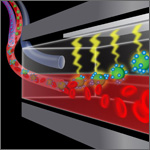
The Wyss Institute for Biologically Inspired Engineering at Harvard University announced Saturday that it has been awarded a $9.25-million contract to further advance the blood-cleansing technology developed with the Defence Advanced Research Projects Agency (DARPA) support, reports Science Daily.
The DARPA has also asked the institute to help accelerate the technology’s translation to humans as a new type of sepsis therapy.
The device will be used to treat bloodstream infections that are the leading cause of death in critically-ill patients and soldiers injured in combat.
To rapidly cleanse the blood of pathogen, the patient’s blood is mixed with magnetic nano-beads coated with a genetically-engineered version of a human blood “opsonin” protein that binds to a wide variety of bacteria, fungi, viruses, parasites, and toxins.
It is then flowed through micro-channels in the device where magnetic forces pull out the bead-bound pathogen without removing human blood cells, proteins, fluids, or electrolytes — much like a human spleen does. The cleansed blood then flows back to the patient.
“In just a few years we have been able to develop a suite of new technologies, and to integrate them to create a powerful new device that could potentially transform the way we treat sepsis,” said Wyss founding director and project leader Don Ingber.
“The continued support from DARPA enables us to advance our device manufacturing capabilities and to obtain validation in large animal models, which is precisely what is required to enable this technology to be moved towards testing in humans,” Ingber added.
The opinions, beliefs and viewpoints expressed by authors, news service providers on this page do not necessarily reflect the opinions, beliefs and viewpoints of Hill Post. Any views or opinions are not intended to malign any religion, ethnic group, club, organization, company, or individual.
Hill Post makes no representations as to the accuracy or completeness of any information on this site page.



